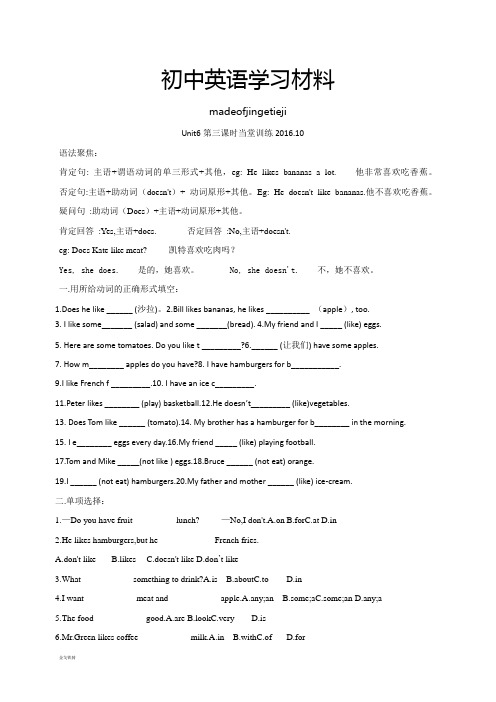人教英语七年级上第六单元第四课时
- 格式:pptx
- 大小:108.85 KB
- 文档页数:11

人教版七年级英语上册Unit 6 教学设计(1)《修改后》《英语》一、课题:Do you like bananas ?二、教学目标(知识目标、能力目标、德育目标)知识目标:1)单词:do, don’t, does, doesn’t, strawberries, like, have, hamburgers, orange, tomatoes, ice cream, broccoli, salad, French fries, bananas.1. 全体学生都能正确认读这些单词、词组2. 优等生能正确书写strawberries, like, have, hamburgers, orange, tomatoes, ice cream, broccoli, salad, French fries, bananas2)句型:Do you like bananas?Yes, I do. / No, I don’t.1. 后进生能读出句子2. 大部分学生能正确理解并根据图画应用3. 优等生能假设情景熟练对话能力目标:通过学习本课,大部分学生能够用英语互相讨论喜欢与不喜欢的食品。
部分学生能进行情景对话表演德育目标:讨论美食,能喜欢应用本课目标语讨论喜欢与不喜欢的食品。
设计思路:1. 教学目标要体现学生为主体,要充分解读学生的基础上从学生的角度设计。
一是分析学生、二是换位思考。
2. 教学目标要体现具体任务,以学生能做某事为任务。
3. 教学目标要体现发展,要让学生有收获有发展。
4. 要面向全体学生,因材施教三、教学设计的思路及教学建议第六单元的主题是“询问对方喜欢与不喜欢的食物”,这些食物都是学生比较熟悉的生活食品。
在教学时老师能够使用实物进行教学,增强学生的学习兴趣和学习效果。
在传授新知识时,为了为学生创设真实的,贴近生活的情境,可以设计一些游戏,即根据不同人对食物的不同喜好,自配营养餐和填写购物清单等,这样不但激发了学生学习的热情,也达到了练习重点句型的目的。

初中英语学习材料madeofjingetiejiUnit6第三课时当堂训练2016.10语法聚焦:肯定句: 主语+谓语动词的单三形式+其他,eg: He likes bananas a lot. 他非常喜欢吃香蕉。
否定句:主语+助动词(doesn't)+ 动词原形+其他。
Eg: He doesn't like bananas.他不喜欢吃香蕉。
疑问句:助动词(Does)+主语+动词原形+其他。
肯定回答:Yes,主语+does. 否定回答:No,主语+doesn't.eg: Does Kate like meat? 凯特喜欢吃肉吗?Yes, she does. 是的,她喜欢。
No, she doesn't. 不,她不喜欢。
一.用所给动词的正确形式填空:1.Does he like ______ (沙拉)。
2.Bill likes bananas, he likes __________ (apple), too.3. I like some_______ (salad) and some _______(bread).4.My friend and I _____ (like) eggs.5. Here are some tomatoes. Do you like t _________?6.______ (让我们) have some apples.7. How m________ apples do you have?8. I have hamburgers for b___________.9.I like French f _________.10. I have an ice c_________.11.Peter likes ________ (play) basketball.12.He doesn’t_________ (like)vegetables.13. Does Tom like ______ (tomato).14. My brother has a hamburger for b________ in the morning.15. I e________ eggs every day.16.My friend _____ (like) playing football.17.Tom and Mike _____(not like ) eggs.18.Bruce ______ (not eat) orange.19.I ______ (not eat) hamburgers.20.My father and mother ______ (like) ice-cream.二.单项选择:1.—Do you have fruit _________ lunch? —No,I don't.A.on B.forC.at D.in2.He likes hamburgers,but he ____________ French fries.A.don't likeB.likesC.doesn't likeD.don’t like3.What ___________ something to drink?A.is B.aboutC.to D.in4.I want ___________ meat and ___________ apple.A.any;an B.some;aC.some;an D.any;a5.The food ___________ good.A.are B.lookC.very D.is6.Mr.Green likes coffee ___________ milk.A.in B.withC.of D.for7.Do you have ___________ good friends at school?A.some B.aC.any D.an8.I can have different ___________ lunch.A.vegetables forB.foods forC.vegetable onD.food on9.—Would you like ___________ apples? —No,thanks.A.any B.someC.much D.a little10.—Do you like carrots? —___________.A.Yes,I do.B.I like them.C.See you later.D.I don't like them.11. –Does your friend like salad? -- _________.A. Yes, she like.B. No, she does.C. Yes, she doesn’tD. No, she doesn’t.12.I have hamburgers ____________ breakfast.A.atB.onC.forD.in13.—Please ____________ for lunch. —Thank you very much.A.have some chickenB.like fried chipsC.play basketballD.has some chicken14.—Do you have fruit ________lunch? —No,I don't.A.on B.forC.at D.in15.He likes hamburgers,but he ________French fries.A.don't likeB.likesC.doesn't likeD.doesn’t likes三.按要求完成下列各题:1.We have chicken for lunch. (就画线部分提问)_______ _______ you have for lunch?2.Tom doesn’t like basketball.(改为肯定句)Tom ______ basketball.3.The sports star eats well.(改为否定句)The sports star _____ ______ well.4.Does she salad every day?(做否定回答)_______, ______ _______.5.for, he, hamburgers, has, breakfast (.) 连词成句_________________________________四.根据汉语意思完成句子,每空一词1.你晚饭吃什么?What do you have ______ _______?2.---汤姆喜欢蔬菜吗?---不,他不喜欢。

第四课时Section B(3a—3c)
教学目标
通过本课的学习,学生能够:
1.利用看、读、说、写等活动搜集、整理所需要的语言基础信息。
(获取信息)
2.正确使用涉及姓名、年龄、居住地、喜好等个人信息方面的词汇和句型,利用英语说明文的写作方法及技巧,学会以人物介绍为主线介绍自己和朋友。
(梳理整合)
3.运用本单元所学语言,写出完整的个人档案,并能够进一步修改完善形成正式的学生档案页,列入班级档案册。
(内化应用)
4.积极参与教师组织的项目,乐于分享交流并享受其中的快乐;通过个人信息的分享,增强自信,尽快融入新的初中生活。
(迁移创新)
语篇研读
What:本课项目是制作个人简介。
Why:通过个人档案的制作,提升学生综合运用本单元的目标句型的能力,培养学生的核心素养。
How:通过小组活动,学生针对相关话题发表自己的看法。
教学过程
设计理念:以《义务教育英语课程标准(2022年版)》核心素养为导向,以单元主题为引领,基于语篇的育人理念,体现《义务教育英语课程标准(2022年版)》“学
综合运用语言知识的能力【内化应用】板书设计
作业设计
基础型作业:Review Unit 1 and make a mind map.
实践型作业:Make a personal profile with your photo.
拓展型作业:Write a short passage about your favourite sport.
教学反思。


人教版七年级英语上册第六单元知识点常用词组1. my birthday dinner 我的生日宴会2. vegetable salad 蔬菜沙拉3. two tomatoes 两个西红柿4. eat well 吃得好5. think about 思考;思索6. eat/have breakfast/lunch/dinner吃早/中/晚饭7. a sports/volleyball star 一位运动/排球明星8. next/this/last week 下/这/上星期9. ask sb. about sth. 问某人关于某事10. like hamburgers/ice-cream喜欢汉堡包/冰激凌11. like eating eggs 喜欢吃鸡蛋12. her eating habits 她的饮食习惯13. like chicken for dinner 喜欢吃鸡肉当作晚饭14. one last question 最后一个问题15. healthy food 健康的食物16. after breakfast/lunch/dinner 早/中/晚饭后17. want to be fat/healthy 想要变胖/健康18. have bread for breakfast 早饭吃面包19. a lot of strawberries=lots of strawberries=many strawberries 许多草莓20. a lot of rice=lots of rice=much rice许多米饭重点句型1. —Do you like salad? 你喜欢沙拉吗?—Yes, I do./No, I don't.是的,我喜欢。
/不,我不喜欢。
2. —Does she like tomatoes? 她喜欢西红柿吗?—No, she doesn't. She doesn't like them.不,她不喜欢。

单元教案Do you like bananas?教材依据:新目标英语七年级上册第六单元教学目标(一)语言知识1、词汇:本单元所要求掌握的所有词汇2、日常交际用语:Do you like …? Yes,I do./No, I don’t.I /They like oranges. I/They don’t like bananas.She likes salad. She doesn’t like salad.3、教学重点:1、掌握各种不同的有关食物方面的名词;2、实义动词like 一般现在时的否定式、疑问式及其答语;3、助动词do /does和don’t/doesn’t的用法;4、一日三餐的营养搭配5、小短文的写作4、教学难点:1、Affirmative and negative statements2、Countable nouns and uncountable nouns3、How to talk about likes and dislikes(二)语言技能学生能认识及听懂各种不同的食物名称,区分可数名词和不可数名词,并能自由表达出自己喜欢和不喜欢的食物;能根据单元所学句型自编对话,讨论自己及他人喜欢和不喜欢的食物并扩展到其他方面(如sports),能进行小组讨论并用英语进行简单的陈述(I like…, I don’t like …,he likes…,he doesn’t like….),能进行一日三餐的营养搭配,能根据课前任务收集和整理资料,并对所得资料进行加工和处理,在课堂中合理地加以运用。
(三)学习策略通过学习课文,掌握有关饮食方面的词汇,并结合所学单词,自由讨论喜好。
通过在课文中交流彼此的特长和爱好,培养群体意识,并在小组讨论及合作中,学会合作学习与研究性学习,完成所给任务,努力开拓课程资源。
(四)情感态度激发学生英语学习的欲望和兴趣,敢于用英语进行交流和表达; 营造情感交融的良好氛围,努力提高学生的学习兴趣,学生自主学习、主动合作;认真完成课前任务,在调查中充分发挥自身潜力,培养思维能力、动手能力、开展研究性学习;(五)文化意识能了解东西方不同的饮食文化。
Unit 6 Do you like bananas?话题Topic 谈论食物Talk about food功能Functions 1.能够谈论对食物的喜好Talk about likes and dislikesI like…/I don’t like…2.能够询问别人喜欢什么Talk about what other people likeDo you like…? Do they like …? Does she like…?语法Grammar 一、掌握动词like在一般现在时中的用法The simple present tense to like二、肯定句和否定句Affirmative and negative statementsI don’t like salad.John likes hamburgers.三、一般疑问句及其简略回答Yes/No question and short answersA:Do you like bananas?B:Yes, I do./No, I don’t.A:Does she like tomatoes?与方法在日常生活中运用英语的能力。
2.通过图片提供物体的名称,运用实际例子,感知、学习Do you like…? Yes, I do./No, I don’t. Does he like …? Yes, he does./No, he doesn’t.I don’t like…围绕上面的句型展开操练。
通过调查了解学生们喜欢什么、不喜欢什么,然后在此基础上评价自己和他人的生活是否健康。
情感态度与价值观1.通过任务型活动,使学生们在实际生活中均衡饮食,合理配餐。
2.通过开展小组活动,指导学生积极与他人合作,培养他们的合作精神。
Sectio n A 概述1.本单元主要围绕“谈论对食物的喜好”这一交际功能展开,并以like为例,进一步学习实义动词在一般现在时中的用法,是上一个单元内容的2.活动2让学生使用所学语言谈论自己对不同食物、运动类型以及颜色的喜好。
初一英语第六单元教案【篇一:七年级英语第六单元课堂教学实录】英语教学实录赵本中学王庆学七年级英语第六单元课堂教学实录一、教学目标1.知识目标:1)能将所学单词进行归类。
2)熟练地掌握主语为第三人称单数和非第三人称的否定句、一般疑问句及其回答。
如:do you /they like salad?yes, i /they do.no, i /they don’tdoes he like french fries? yes, he does. no, he doesn’t.i (they) like oranges. i (they) don’t like bananas.she likes bananas. she doesn’t like ice cream.2.能力目标:能用英语熟练地交流喜欢与不喜欢的食品,并在班上提问同学展开调查。
3.情感目标:通过谈论美食,进一步引导学生享受美味生活,同时培养学生的合作学习精神。
二、教学重点:掌握主语为三单和非三单时的陈述句、否定句、一般疑问句及其回答的形式。
三、教学难点:主语是第三人称单数时的否定句和疑问句中的动词变化形式。
四、教学设计:step 1. 复习前课所学单词与句型:通过看图片说单词的方式复习单词,并通过询问学生“do you like bananas/ oranges??”的形式,复习前一课的句型。
t: yesterday, we learned many words about food, right? do you still remember? now please look at the screen.t: what’s this?ss: apple.t: do you like apples?ss: yes, i do.t: and what’s this?ss: banana.t: yes, what about this one?ss: broccoli.t: do you like broccoli?ss: no, i don’t.t: yes, good job! you have good memory!step 2. 导入新课:分别请一男孩和女孩回答老师的问题,说出他们喜欢与不喜欢的食物,然后就这两位学生的情况向全班提问,以此介绍主语为三单和非三单时的各种句型。